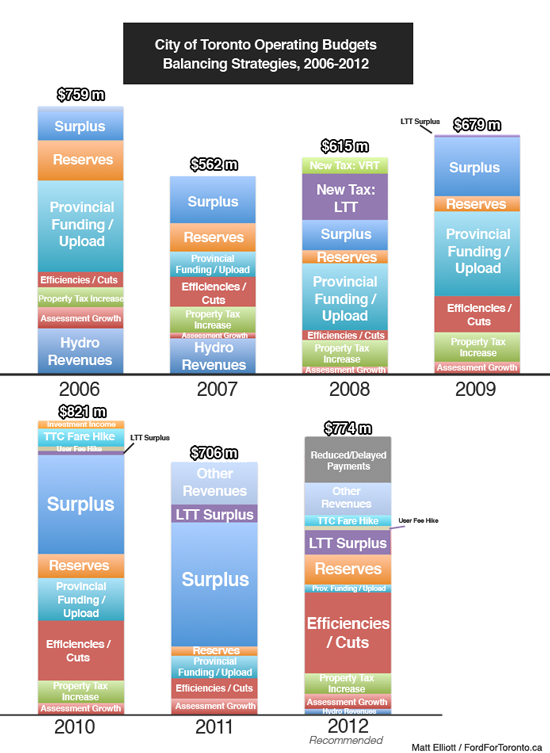“A smart budget,” the mayor called it. “A responsible budget.” But what we got this morning was anything but. Instead, Rob Ford finally produced evidence, under the guise of launching the City’s 2012 budget process, that the apocalyptic budget scenarios his administration has been spinning for the last year have been a waste of everyone’s time. Toronto isn’t Greece or any other bankruptcy-skirting nation. We’re simply a city that cut too much revenue last year, and now we’re using service cuts to make up the difference.
Standing behind a podium labeled with a “Rebuilding our Fiscal Foundation” sign, Ford introduced the messaging he’ll be using through the budget process and probably well into next year. It goes like this: we’re the first government in Toronto’s history to reduce the size of the operating budget year-over-year; we inherited this mess from the previous administration; and this is what the taxpayers want us to do.
His numbers, of course, don’t add up. Ford claimed that his team had found $355 million in savings “through our Core Service Review, service efficiencies and modest service adjustments.” But to get that number, he had to include budget reductions that came from things like restructuring debt payments and delaying capital financing. It also includes $28 million from a lowered forecast for employee compensation. So staff overestimated on a budget line, then reduced that estimate, and Rob Ford claims it as a savings to the taxpayer. Like magic. His claim of lowering the operating budget year-over-year is also dubious, as the net operating budget — the part funded by property taxes — still increased by almost $100 million. The reductions, then, come exclusively from areas funded by grants or user fees, like the TTC.
The reality, as displayed in the chart above, is that 2012 would have been one of the easiest-to-balance budgets in post-amalgamation Toronto’s history if not for a series of fiscal decisions made by the Ford administration. Had Council not approved a property tax “freeze” and the hasty elimination of the Vehicle Registration Tax, more than $100 million in annual revenue would be available to balance next year’s budget. If Ford would acknowledge that, with the Land Transfer Tax and other revenues, the City actually enjoys something of a structural surplus, some of the staff-estimated $139 million left over from the 2011 budget could justifiably be rolled over into 2012, preserving service at the TTC, the Toronto Public Library and other agencies and departments currently facing the budget axe.
Instead, Ford will continue down the same clumsy path he’s been on for the last year. The one where he tells us that an insurmountable budget gap — one he “inherited” from a government he was part of — requires cuts to service, despite a mountain of evidence to the contrary. Now that we have the numbers in front of us, the mayor’s rationale makes even less sense: taking even a small percentage of the surplus revenue generated by the Land Transfer Tax last year could, for example, eliminate the need for all the TTC cuts currently on the table.
It’s time to put all the phoney talk of the $774 million shortfall behind us, and wake up to the fiscal reality. The City has — and always has had — options beyond the budget axe. It’s the refusal to acknowledge these options that hurts the city the most.
Toronto’s Operating Budgets: A History of Balancing Strategies
With the release of today’s budget documents, I’ve updated the chart below from a previous post to include the staff recommended balancing strategy for 2012. The most striking difference is the lack of surplus dollars. Ford and Budget Chief Mike Del Grande aren’t eschewing the use of one-time funds to balance the budget, however: they’re taking a generous amount of reserve dollars for similar purposes.
Tags: budget, car tax, mike del grande

